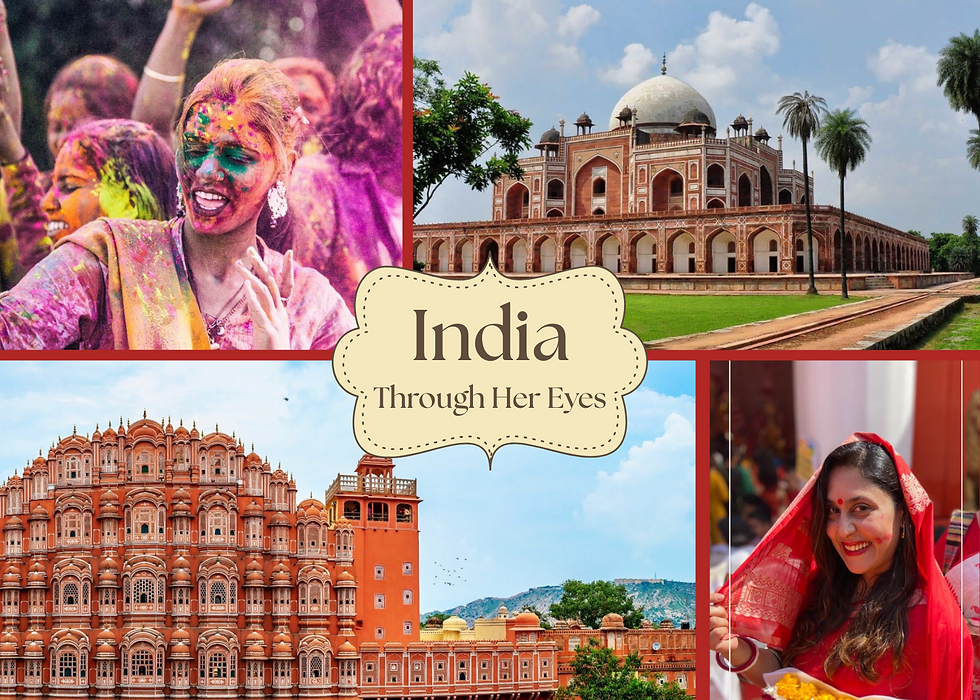Diwali: The Festival of Lights and the 5 Days of Celebrations in India
- Jennifer Spatz
- Oct 23, 2022
- 3 min read
Diwali, known as the Festival of Lights, takes place on the darkest day of the new moon during the Hindu month Kartik, the eighth month of the year marking the Hindu New Year, which falls in late October or early November. It is a holiday celebrated worldwide by Hindus, as well as Sikhs and Buddhists, and has some special traditions associated with it.
The name Diwali comes from the Sanskrit term dipavali, meaning “row of lights,” and the festival generally symbolizes the victory of light over darkness. The lights of Diwali also signify a time of inner illumination, and Hindus believe that these lights steadily shines in the chamber of the heart.

The celebrations and traditions of Diwali in India are as diverse as the nation itself. In the north, for example, Hindus mark it as the day King Rama returns to his kingdom of Ayodhya after defeating Ravana, the 10-headed king of the demons, by lighting rows of clay lamps. Then in the south, it celebrates Lord Vishnu, sending the demon King Bali to rule the nether world.
The Five Days of Diwali and How they are Celebrated
This widely-enjoyed holiday encompasses a five-day celebration of life and the victories of good over evil and the main celebration is the third day is, which is actually called Diwali. On this day people light dozens of candles and clay lamps (called diyas), placing them throughout their homes and in the streets to light up the dark night.

Day 1 of Diwali: Dhanteras
The first of the five days of Diwali begins with Dhanteras, a day of cleaning and decorating. On this day, colorful Ragnoli designs made of colored rice and/or sand, and earthen diyas and candles brighten up homes and businesses to welcome the goddess of wealth and prosperity, Lakshmi. It is considered auspicious to purchase valuables such as precious metals on this day.

Day 2 of Diwali: Kali Chaudas
The second day of Diwali is known as Kali Chaudas or Narak Chaturdasi, and commemorates the day that Lord Krishna destroyed the demon Narakasur and made the world free from fear. The day starts before sunrise or during moon rise with a holy bath called Abhyang Snan. People celebrating use a special ayurvedic mixture, called ubtan, as herbal soap. This day is also day dedicated to the worship of Mahakali or Shakti, the Goddess who is considered responsible for creation and the agent of all change. The rest of this day is spent offering puja (prayers) to remove any laziness and wickedness from their life, making local delicacies with pounded, semi-cooked rice, and exchanging gifts.

Day 3 of Diwali
The third day of Diwali is the actual Diwali (or Deepawali) and is the most important of the five days. Diwali is a day for families to gather together to worship Lakshmi and visit temples, gurudwaras, and churches to light candles. Then as night falls, they enjoy a wondrous feast and watch fireworks light up the sky. It is believed that their sound and light ward off evil spirits.

Day 4 of Diwali: Gurarati in South India or Govardhan Puja and Vishwakarma Day in North India
Celebrations on the fourth day of Diwali vary by region, known as the Gujarati New Year in western India, or Govardhan Puja and Vishwakarma Day in the North. The latter is named after a Hindu god known as the divine architect who built the holy city of Dwarka and created weapons for the gods. In modern times, people worship their tools – including electronic servers – in his name.

Day 5 of Diwali: Siblings Day or Bhai Dooj
Finally, the fifth day of Diwali is known as Bhai Dooj and is a day for siblings (The name 'Dooj' means the second day after the new moon, the day of the festival, and 'Bhai' means brother) On this day, brothers visit their sisters’ homes for a feast and quality time. The meal signifies the sister’s blessings for her brother and her brother’s duty to protect her and mimics the story of when the god of death, Yamaraj, visits his sister and is showered with affection.

The traditions of Diwali are as diverse and rich with cultural history and spirituality as the country of India itself. We invite you to explore them with us and the magic of this country to their fullest on one of Global Family Travels’ incredible tours to India.





Comments